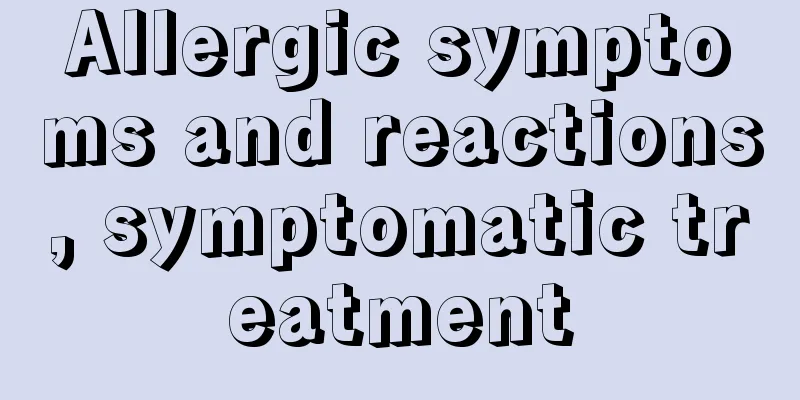Allergic symptoms and reactions, symptomatic treatment

|
In life, you may develop allergies if you are not careful. If you have allergic symptoms, you need to seek treatment as soon as possible, and the allergic reactions caused by different allergens are also different. When conducting treatment, you must choose the appropriate method. The following introduces the symptoms of allergic reactions so that you can provide symptomatic treatment. 1. The characteristic of allergic reaction is that the reaction occurs extremely quickly, especially when the allergen is exposed through injection, the onset is extremely rapid, and is described by survivors as a "feeling of being near death." The faster the symptoms appear, the more severe the reaction will be. Symptoms usually begin with tingling around the mouth and face, followed by a feeling of warmth, difficulty swallowing, and tightness in the throat and chest. The onset of generalized itching may be preceded by feelings of fear, weakness, and sweating. The patient then develops redness all over the body, urticaria and angioedema, the edema mainly around the eyes and upper and lower lips, occasionally involving the throat. Some degree of hoarseness, inspiratory dyspnea, dysphagia, nasal congestion, itchy eyes, sneezing, and wheezing may occur. In addition, symptoms such as abdominal cramps, diarrhea, and uterine contractions may also occur. In severe cases, the patient may fall into a coma, have a drop in blood pressure, dull heart sounds, tachycardia or bradycardia, or even an irregular heartbeat, and may die from respiratory and cardiac arrest. Respiratory and circulatory failure caused by upper airway obstruction is often the main cause of death. 2. Most allergic reactions occur within 30 minutes of contact with allergens, especially injections of drugs or insect bites. Fainting and shock may occur within minutes or even 1 minute. After treatment, most patients' symptoms can be relieved within a few hours. Some patients show a biphasic reaction, that is, symptoms are relieved and then relapsed 1 to 8 hours later. This may be related to the shorter duration of action of the first dose of the drug. For some patients, even after active treatment, symptoms and signs persist for hours or even days. This persistent allergic reaction is mostly caused by eating allergens. Biphasic allergic reactions and persistent allergic reactions often occur 30 minutes after contact with the allergen. 3. Food-dependent exercise-induced allergic reactions often occur within 2 hours of eating sensitive foods (shellfish, wheat, vegetables, fruits, etc.). It is usually safer for patients to exercise 3 hours after eating. If they do not exercise, these foods will not cause any adverse reactions for such patients. Exercise-induced anaphylaxis can also occur after taking aspirin or nonalcoholic anti-inflammatory drugs. 4. Paclitaxel mainly causes rash, facial flushing, and mild hypertension, accounting for 40% of the reactions; severe reactions occur in 1% to 3%, manifested as urticaria, general itching, bronchospasm, laryngeal edema, chest tightness, facial flushing or cyanosis, and difficulty breathing. Peripheral vasodilation may cause severe hypotension, syncope, or even shock, and sometimes back pain. |
<<: Is bird's nest cooling or heating in nature?
>>: What fruits are good for people who often stay up late? It turns out to be these eight kinds
Recommend
Common vegetable names
Vegetables are a type of food we often eat. There...
Principles of staging treatment for prostate cancer
For prostate cancer, the most common staging meth...
Which is better for washing your face, vinegar or salt?
Vinegar and salt are both indispensable condiment...
Four high-risk factors for lung cancer
Nowadays, the incidence and mortality of cancer i...
Is it okay to do permanent laser hair removal
In the summer, many girls will shave their armpit...
Benefits of shrug
When we watch dubbed films, we often see some for...
The most common cause of uremia
The origins of all human diseases are not inexpli...
What's wrong with my ankles?
The ankle is a joint in the leg. Sometimes if you...
Is the mold positive serious
Vaginal candidiasis is one of the common gynecolo...
How to cool down the hot house
In the summer, the weather is hot and the tempera...
How long does it take to stop bleeding after wisdom tooth extraction
Wisdom teeth have always been a headache, because...
Is fish an acidic or alkaline food?
Everyone should eat fish frequently, and fish is ...
Effects and functions of opal
The appearance of some stones is not only very be...
4 types of clinical manifestations of prostate cancer
Prostate cancer is a common male malignancy. What...
What nutrients are needed to prevent liver cancer? Five factors that are most likely to induce liver cancer
China is a country with a high incidence of liver...









